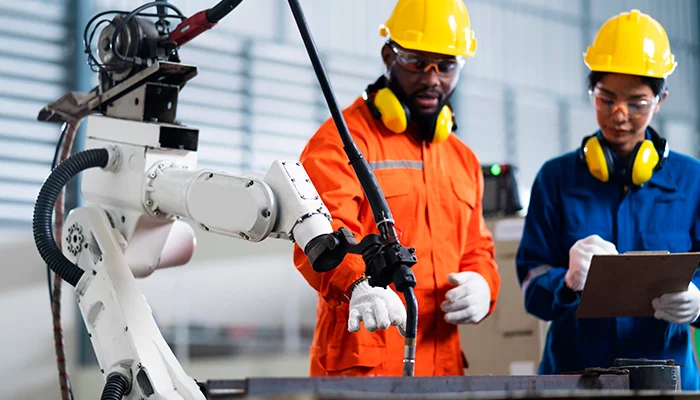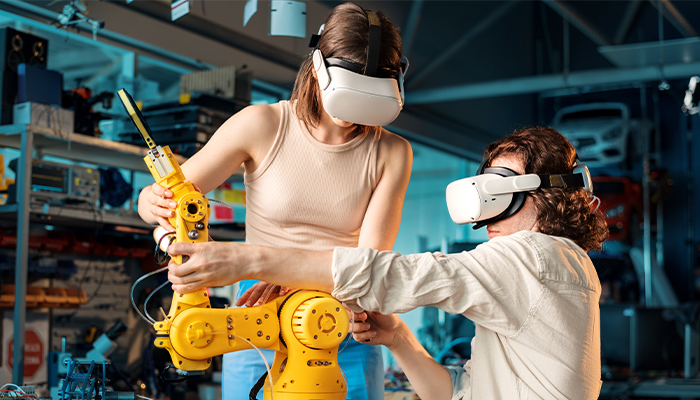Machine Learning in Manufacturing: Benefits and Challenges

AUG, 7, 2024 16:00 PM
Machine Learning in Manufacturing: Benefits and Challenges
Machine learning (ML) has emerged as a transformative force across various industries, with manufacturing being one of the most promising fields. By leveraging the power of data and algorithms, machine learning enables manufacturers to optimize processes, enhance productivity, and drive innovation. This article delves into the advantages and challenges of integrating machine learning in manufacturing, highlighting its applications and services.
Introduction to Machine Learning in Manufacturing
Machine learning, a subset of artificial intelligence (AI), involves the use of algorithms and statistical models to enable computers to perform specific tasks without explicit instructions. In manufacturing, machine learning is applied to analyze vast amounts of data generated by machines, sensors, and production processes. This analysis helps in making informed decisions, predicting outcomes, and automating complex tasks.
Advantages of Machine Learning in Manufacturing
Machine learning (ML) offers numerous advantages in manufacturing, enhancing productivity, efficiency, and overall performance. Let's delve into these benefits in greater detail:
1. Predictive Maintenance
Predictive maintenance is one of the most impactful applications of machine learning in manufacturing. Traditional maintenance approaches, such as scheduled maintenance or reactive repairs, often result in unnecessary downtime or unexpected equipment failures. These interruptions can be costly and disruptive to production schedules.
Machine learning algorithms, however, revolutionize maintenance strategies. By analyzing data from sensors and historical maintenance records, ML can predict when machinery is likely to fail. This predictive capability allows manufacturers to schedule maintenance activities just in time, rather than on a fixed schedule. This approach offers several key benefits:
- Reduced Downtime: Predictive maintenance minimizes unplanned downtime by addressing potential issues before they result in equipment failure. This ensures continuous production and maximizes the utilization of machinery.
- Cost Savings: By preventing unexpected breakdowns, manufacturers save on emergency repair costs and avoid the expense of idle equipment. Additionally, well-maintained machines operate more efficiently, reducing energy consumption and wear-and-tear.
- Extended Equipment Lifespan: Regular, well-timed maintenance extends the operational life of machinery. Predictive maintenance helps identify and fix minor issues before they escalate into major problems, thereby preserving the health of the equipment.
Overall, predictive maintenance enhances operational reliability, reduces costs, and optimizes the use of resources in manufacturing.
2. Quality control and defect detection
Quality control is crucial in manufacturing, where consistent product quality is essential to meet customer expectations and regulatory standards. Traditional quality control methods often involve manual inspections, which can be time-consuming and prone to human error.
Machine learning algorithms significantly improve quality control by analyzing data from various stages of the production process. This analysis can identify patterns and anomalies that indicate potential defects. Here’s how ML enhances quality control:
- Automated Visual Inspections: Integrating machine learning with imaging technology allows for automated visual inspections. High-resolution cameras capture images of products, and ML algorithms analyze these images in real-time to detect defects, such as surface imperfections, misalignments, or incorrect assemblies.
- Real-Time Detection: Machine learning enables real-time detection of defects, allowing for immediate corrective actions. This prevents defective products from reaching customers and reduces the cost of rework and scrap.
- Root Cause Analysis: Beyond detecting defects, machine learning can help identify the root causes of quality issues. By analyzing production data, ML algorithms can pinpoint specific process variables or conditions that contribute to defects, enabling manufacturers to address these factors proactively.
Implementing machine learning in quality control not only ensures higher product quality but also enhances operational efficiency and reduces waste.
3. Supply Chain Optimization
Supply chain management is a complex and critical aspect of manufacturing. Efficient supply chain operations ensure timely delivery of raw materials, optimal inventory levels, and cost-effective logistics. Machine learning offers substantial benefits in optimizing supply chain processes.
- Demand Forecasting: Machine learning algorithms analyze historical sales data, market trends, and other relevant factors to predict future demand accurately. Improved demand forecasting helps manufacturers avoid overproduction and stockouts, leading to better inventory management and reduced holding costs.
- Inventory Optimization: ML can optimize inventory levels by balancing the costs of holding inventory against the risk of stockouts. This ensures that the right amount of inventory is available to meet demand without excessive overstocking, which ties up capital and storage space.
- Logistics Efficiency: Machine learning enhances logistics by optimizing routing, scheduling, and load planning. For example, ML algorithms can identify the most efficient routes for transportation, taking into account factors such as traffic conditions, fuel consumption, and delivery deadlines. This reduces transportation costs and improves delivery times.
By leveraging machine learning, manufacturers can create more responsive and efficient supply chains, ultimately improving customer satisfaction and reducing operational costs.
4. Process Optimization
Manufacturing processes involve numerous variables that can impact efficiency, output, and product quality. Optimizing these processes is essential for maximizing productivity and minimizing waste. Machine learning excels in process optimization by analyzing data from production lines and identifying the best operational conditions:
- Parameter Optimization: In processes such as chemical manufacturing, multiple parameters, such as temperature, pressure, and raw material composition, need to be precisely controlled. Machine learning algorithms can analyze historical process data to determine the optimal settings for these parameters, resulting in higher yields and reduced waste.
- Dynamic Adjustments: Machine learning enables real-time adjustments to production processes based on continuous data analysis. For example, if a sensor detects a deviation from the optimal conditions, ML algorithms can automatically adjust the process parameters to maintain quality and efficiency.
- Predictive Process Control: ML can predict process outcomes based on input variables, allowing manufacturers to proactively adjust processes to achieve desired results. This predictive capability ensures consistent product quality and minimizes the risk of defects.
Process optimization through machine learning leads to more efficient production, higher-quality products, and reduced operational costs.
5. Energy Management
Energy consumption is a significant cost factor in manufacturing. Efficient energy management is crucial for reducing operational costs and minimizing environmental impact. Machine learning provides powerful tools for optimizing energy usage.
- Energy Consumption Analysis: Machine learning algorithms analyze data from sensors and energy meters to identify patterns and anomalies in energy consumption. This analysis helps manufacturers understand how and when energy is being used, enabling them to identify opportunities for optimization.
- Energy-Saving Measures: ML can suggest energy-saving measures based on data analysis. For instance, it can recommend adjusting machine settings, scheduling energy-intensive tasks during off-peak hours, or identifying underperforming equipment that consumes excessive energy.
- Predictive Energy Management: Machine learning can predict future energy consumption based on historical data and production schedules. This predictive capability allows manufacturers to plan energy usage more effectively and take advantage of lower energy rates during off-peak periods.
Implementing machine learning for energy management not only reduces operational costs but also supports sustainability initiatives by minimizing the carbon footprint of manufacturing operations.
Machine Learning Applications in Manufacturing
Machine learning has a broad range of applications in manufacturing, transforming various aspects of the production process and supply chain. Here’s an in-depth look at some of the most significant applications:
1. Predictive Analytics
Predictive analytics is a powerful application of machine learning that helps manufacturers anticipate and respond to future events. By analyzing historical data, machine learning models can identify patterns and trends that indicate potential issues or opportunities. Key benefits of predictive analytics in manufacturing include:
- Equipment Failure Prediction: Machine learning algorithms can analyze data from sensors, maintenance logs, and operational records to predict equipment failures. By identifying signs of wear and tear or unusual performance patterns, manufacturers can schedule maintenance before a failure occurs, thereby reducing downtime and maintenance costs.
- Production Delay Mitigation: Predictive analytics can foresee potential production delays by examining factors such as machine performance, workforce availability, and supply chain disruptions. This allows manufacturers to adjust schedules, allocate resources more effectively, and ensure timely delivery of products.
- Demand Forecasting: Machine learning models can analyze market trends, historical sales data, and external factors (such as economic indicators) to predict future demand. Accurate demand forecasting helps manufacturers optimize inventory levels, reduce excess stock, and improve customer satisfaction by ensuring products are available when needed.
Predictive analytics empowers manufacturers to make data-driven decisions, enhancing efficiency and competitiveness.
2. Robotics and Automation
Machine learning significantly enhances the capabilities of industrial robots, making them more intelligent, adaptable, and efficient. Through techniques such as reinforcement learning and computer vision, robots can perform complex tasks with high precision. Key applications include:
- Assembly: Machine learning algorithms enable robots to learn and improve their assembly techniques over time. By analyzing data from previous assembly tasks, robots can optimize their movements and adapt to variations in the components, ensuring consistent quality and reducing the need for human intervention.
- Welding: Machine learning enhances the precision of robotic welding by analyzing parameters such as heat, speed, and positioning. Robots can adjust their actions in real-time to achieve optimal welds, reducing defects and improving the strength and durability of the final product.
- Packaging: Robots equipped with machine learning capabilities can handle various packaging tasks, such as sorting, packing, and palletizing. By analyzing product dimensions, weight, and other factors, robots can optimize the packaging process, ensuring efficient use of materials and reducing shipping costs.
Robotics and automation, powered by machine learning, not only increase productivity but also ensure consistent quality and reduce operational costs.
3. Production Planning
Effective production planning is crucial for manufacturers to meet customer demands, minimize costs, and optimize resource utilization. Machine learning algorithms analyze a multitude of factors to create optimized production schedules. Key aspects of machine learning in production planning include:
- Order Volume Analysis: By examining historical order data and current market trends, machine learning models can predict future order volumes. This helps manufacturers plan production runs more accurately, reducing the risk of overproduction or stockouts.
- Lead Time Optimization: Machine learning can analyze lead times for different processes and suppliers, identifying bottlenecks and areas for improvement. This allows manufacturers to streamline production workflows and reduce overall lead times, ensuring timely delivery of products.
- Resource Allocation: Machine learning algorithms consider factors such as workforce availability, machine capacity, and material inventory to allocate resources effectively. This ensures that production schedules are realistic and achievable, maximizing resource utilization and minimizing idle time.
Machine learning-driven production planning enhances operational efficiency, reduces costs, and improves the ability to meet customer demands.
4. Predictive Quality
Predictive quality involves using machine learning to identify and address factors that affect product quality before defects occur. By analyzing data from various stages of the production process, ML models can predict potential quality issues and recommend corrective actions. Key benefits include:
- Early Detection of Quality Issues: Machine learning algorithms can detect subtle patterns and deviations in production data that may indicate potential quality problems. By identifying these issues early, manufacturers can take corrective actions to prevent defects and ensure that products meet the required standards.
- Continuous Quality Improvement: Machine learning enables continuous monitoring and analysis of quality data, allowing manufacturers to identify trends and areas for improvement. This supports ongoing quality improvement initiatives and helps maintain high standards of product quality.
- Reduced Risk of Recalls: By predicting and addressing quality issues before products reach the market, machine learning reduces the risk of costly recalls and damage to the brand’s reputation. Ensuring high-quality products also enhances customer satisfaction and loyalty.
Predictive quality leverages machine learning to enhance product quality, reduce waste, and improve overall manufacturing efficiency.
5. Anomaly Detection

Anomaly detection is critical for identifying unusual patterns or behaviors that could indicate problems in the manufacturing process. Machine learning excels at analyzing data from sensors, machines, and production lines to detect anomalies in real-time. Key applications of anomaly detection include:
- Equipment Monitoring: Machine learning algorithms can monitor data from various sensors on equipment to detect anomalies that may indicate impending failures or performance issues. By identifying these anomalies early, manufacturers can perform preventive maintenance and avoid costly breakdowns.
- Process Control: Anomaly detection helps ensure that manufacturing processes remain within specified parameters. Machine learning models can detect deviations from the norm, allowing operators to make necessary adjustments and maintain process stability.
- Quality Assurance: By analyzing production data, machine learning can identify anomalies that may affect product quality. For example, deviations in temperature, pressure, or material composition can be detected and addressed promptly, ensuring that the final product meets quality standards.
Anomaly detection using machine learning enhances operational reliability, reduces downtime, and improves overall manufacturing performance.
Machine Learning Services in Manufacturing
1. Data Collection and Integration
Effective machine learning requires high-quality data. Machine learning services in manufacturing include data collection from various sources, such as sensors, machines, and enterprise systems. This data is then integrated into a centralized platform for analysis.
2. Model Development and Training
Developing accurate machine learning models involves selecting the right algorithms, preprocessing data, and training the models on relevant datasets. Machine learning services provide expertise in model development, ensuring that the models are robust and reliable.
3. Deployment and Monitoring
Once the machine learning models are developed, they need to be deployed in the manufacturing environment. Machine learning services handle the deployment process, ensuring that the models integrate seamlessly with existing systems. Continuous monitoring is also provided to track the performance of the models and make necessary adjustments.
4. Maintenance and Support
Machine learning models require regular maintenance to ensure their accuracy and effectiveness. Machine learning services offer ongoing support, including model updates, performance optimization, and troubleshooting.
Challenges of Implementing Machine Learning in Manufacturing
1. Data Quality and Availability
The success of machine learning in manufacturing heavily depends on the quality and availability of data. Inconsistent, incomplete, or inaccurate data can lead to unreliable models and incorrect predictions. Manufacturers need to invest in robust data collection and management systems to ensure data integrity.
2. Integration with Legacy Systems
Many manufacturing facilities operate with legacy systems that were not designed to work with modern machine learning technologies. Integrating machine learning solutions with these systems can be challenging and may require significant upgrades or customizations.
3. Skilled Workforce
Implementing machine learning in manufacturing requires a skilled workforce with expertise in data science, machine learning, and domain knowledge of manufacturing processes. There is a growing demand for professionals who can bridge the gap between these fields, making it essential for manufacturers to invest in training and development.
4. Cost and Investment
While machine learning can offer substantial benefits, the initial cost of implementation can be high. Manufacturers need to invest in hardware, software, and personnel to develop and deploy machine learning solutions. Assessing the return on investment (ROI) and long-term benefits is crucial to justifying these expenses.
5. Security and Privacy
Machine learning in manufacturing often involves handling sensitive data, such as production details and proprietary information. Ensuring data security and privacy is critical to prevent unauthorized access and protect intellectual property. Manufacturers need to implement robust security measures to safeguard their data.
Conclusion
Machine learning has the potential to revolutionize the manufacturing industry by improving efficiency, reducing costs, and driving innovation. From predictive maintenance and quality control to supply chain optimization and process improvement, the applications of machine learning are vast and varied. However, successful implementation requires addressing challenges related to data quality, system integration, workforce skills, cost, and security.
As manufacturers continue to adopt machine learning technologies, the industry will witness significant advancements in automation, productivity, and competitiveness. By leveraging machine learning services, manufacturers can navigate the complexities of implementation and unlock the full potential of this transformative technology. Embracing machine learning in manufacturing is not just an option but a necessity for staying ahead in a rapidly evolving landscape.
Strategy
Design
Blockchain Solution
Development
Launching
Testing
Maintenance
Contact US!
India

Plot 378-379, Udyog Vihar Phase 4 Rd, near nokia building, Electronic City, Phase IV, Sector 19, Gurugram, Haryana 122015
Copyright © 2025 PerfectionGeeks Technologies | All Rights Reserved | Policy
Strategy
Design
Blockchain Solution
Development
Contact US!
India 
Plot 378-379, Udyog Vihar Phase 4 Rd, near nokia building, Electronic City, Phase IV, Sector 19, Gurugram, Haryana 122015
USA 
1968 S. Coast Hwy, Laguna Beach, CA 92651, United States
Copyright © 2025 PerfectionGeeks Technologies | All Rights Reserved | Policy






